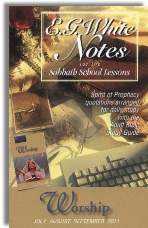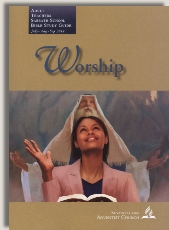|
||||||||||||||
Commentary on "Worship in Genesis: Two Classes of Worshipers"
Day 6: Thursday, June 30, 2011 - Bethel, the House of God
Overview
While the today’s lesson theme is centered on worshiping in ‘the house of God’, the secondary theme continues the ‘two lines of worship’ concept by comparing the life of Jacob with that of Esau.
Isaac prayed to the Lord on behalf of his wife because she was childless. The Lord heard his prayer, and his wife Rebekah conceived. But the children inside her struggled with each other, and she said, “Why is this happening to me?” So she went to inquire of the Lord. And the Lord said to her:
Two nations are in your womb; two people will ⌊come⌋ from you and be separated. One people will be stronger than the other, and the older will serve the younger.
When her time came to give birth, there were indeed twins in her womb. The first one came out red-looking, covered with hair like a fur coat, and they named him Esau. After this, his brother came out grasping Esau’s heel with his hand. So he was named Jacob. Isaac was 60 years old when they were born. (Gen 25:21-26 HCSB)
Esau: Means ‘hairy’ or ‘complete’ with reference to the fact that he was born complete with a lot of hair.
Jacob: Means he who ‘supplants’ with obvious reference to when he would trick his brother out of his birthright, and later, trick his father in giving him the blessing intended for the older son.
Israel: Later, Jacob’s name is changed to ‘Israel’ which is generally understood to mean ‘he who struggles, wrestles and contends with God’.
Observations
The biblical account logically focuses on the life of Jacob since he is of ‘the line of promise’ which God first proclaimed to his Grandfather Abraham. Jacob is the father of twelve sons who would become the heads of the twelve tribes of Israel, the new name God gave him upon his return to ‘the land of promise’.
There are several reasons why Esau should not be compared with Cain in extending the ‘two lines of worship’ concept.
About the only recorded serious flaw in Esau’s character other than he didn’t value his birthright as much as he should have is that he married Hittite women which was especially offensive to his parents. In defense of Esau, the Mosaic Laws and the Old Covenant enacting those laws which prohibited such a relationship did not yet exist. Also, since Jacob was the husband of two official wives and two concubines, he should logically come under an equal amount of criticism as his brother if we are going to give them fair and equal treatment in a court of law.
Second, we know virtually nothing about how Esau may have or have not worshiped God. While his wives probably had pagan gods that would have diverted his attention from worshiping the true God, we are simply not told and do not know.
Third point has to do with how Esau reacted to Jacob’s return to the ‘land of promise’.
But Esau ran to meet him, hugged him, threw his arms around him, and kissed him. Then they wept. When Esau looked up and saw the women and children, he asked, “Who are these with you?” He answered, “The children God has graciously given your servant.” Then the female slaves and their children approached ⌊him⌋ and bowed down. Leah and her children also approached and bowed down, and then Joseph and Rachel approached and bowed down. So Esau said, “What do you mean by this whole procession I met?” “To find favor with you, my lord,” he answered. “I have enough, my brother,” Esau replied. “Keep what you have.” (Gen 33:4-9 HCSB)
In their reunion described in the passage above, we have a scene where they hugged, kissed and cried together. Esau obviously now loved his brother and was glad about his return. Esau had far more upright moral character for us to consider than anything scripture reveals in the life of Cain.
Summary
- If we insist on maintaining the ‘two lines of worship’ concept by comparing the relationship of Jacob and Esau with that of Cain and Abel, we run into serious difficulty because Jacob had acknowledged character flaws which could be construed to be at least equal to that of his brother.
- We know nothing about who Esau may or may not have worshiped. Doctrines and theological theory must be founded upon clear solid biblical facts or it becomes nothing more than human reasoning.
- The meeting of Esau with his brother upon Jacob’s return to ‘the land of promise’ reveals Esau’s moral character to be far higher than anything we know about Cain.
- Before either brother had been born or had done anything good or bad, God ordained that “the older would serve the younger”. This means that our examining and comparing the character or conduct of the brothers adds nothing to our understanding because God is sovereign and is not accountable to us sinful mortals for his actions. We do not know and cannot explain why God chose Jacob over Esau.
Copyright 2011 BibleStudiesForAdventists.com. All rights reserved. Revised June 26, 2011. This website is published by Life Assurance Ministries, Glendale, Arizona, USA, the publisher of Proclamation! Magazine. Contact email: BibleStudiesForAdventists@gmail.com.
The Sabbath School Bible Study Guide and the corresponding E.G. White Notes are published by Pacific Press Publishing Association, which is owned and operated by the Seventh-day Adventist church. The current quarter's editions are pictured above.
Official Adventist Resources
Standard Edition Study Guide Week 1
Teacher's Edition Study Guide Week 1
Easy Reading Edition Study Guide Wk 1
Search the Complete Published Ellen G. White Writings
Please Support This Project


